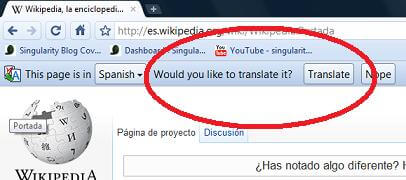Have You Noticed Chrome’s Auto-Translator? It’s Awesome (video)

Share
Earlier this year Google quietly rolled out one of the best features of their Chrome web browser: an automatic translation service. The Translation Bar pops up whenever the program detects that a page you are viewing is in a language other than your preferred one. With one simple click, the bar will send the page to Google Translate (sans your cookies and other personal info) and get a translated copy appearing in your browser, typically in just one or two seconds. The service is automatic, free, and available for 52 different languages. It's far from perfect, but it's the closest thing to a universal translator on the web. Check out Google's explanation video below for Chrome's automatic language translation. You've got to try it!
Chrome is quickly becoming my favorite browser, and the translation bar is a big reason why. I simply don't have to worry about where my content is generated. Translations aren't perfect - I recommend flipping through Wikipedia's various language portals to get an idea of the range of errors you'll encounter using the service - but they're usually more than enough for me to understand what's going on all over the world. For a science journalist this is a huge deal, but it's useful to anyone who wants access to global content.
Be Part of the Future
Sign up to receive top stories about groundbreaking technologies and visionary thinkers from SingularityHub.


Like so many new things we probably won't know our appetite for that content until it arrives, but automatic translation means that many more of us could be exposed to it very easily. Part of what makes the Translation Bar so ideal is that it is embedded in Chrome's functionality, so you probably would never notice it until you used it. In fact, I used it a few times before I realized it was a feature of Chrome. In that way, a friend could send you a foreign link and you could be reading it in your own language without even worrying about its country of origin. That's an amazing capability and the essence of universal translation.
Google isn't the only one looking to break down the language barrier. Twitter's moving in that direction as well, and we've seen some phenomenal smart phone applications that handle translating audio really well. Clearly there are tons of companies with language services, but Google is already king of the web, so it looks like it will be king of web translations too. Hopefully its machine translations will steadily improve to the point where they approach human services (this is likely to take years, of course). Eventually automatic translators will allow us to explore the internet as a truly world wide web. It should be interesting to see how long it takes for us to trust and rely upon them. I've already started taking Chrome's translations for granted. Try it out for a while and you will too.
tro mig
πιστέψτε με
geloof me
날 믿어
créeme
صدقوني
naniniwala ako
aminini
ผมเชื่อว่า
поверьте мне
باور کن
相信我
creidim dom
glauben Sie mir
תאמין לי
[source: Google]
Related Articles

This Light-Powered AI Chip Is 100x Faster Than a Top Nvidia GPU

Hugging Face Says AI Models With Reasoning Use 30x More Energy on Average

Study: AI Chatbots Choose Friends Just Like Humans Do
What we’re reading
